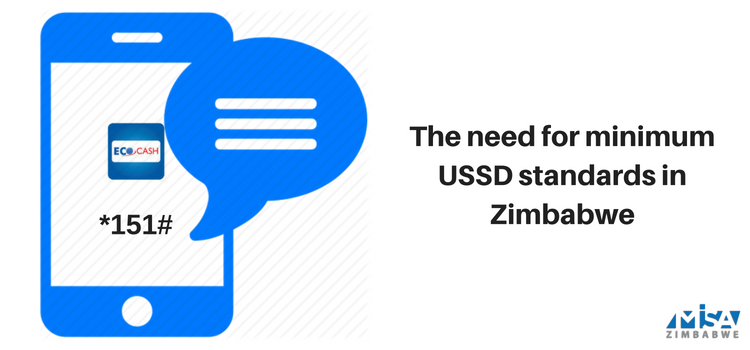On the 2nd and 3rd of July 2018 consumers nationwide struggled to make Ecocash transactions as the system was not working. Mobile banking consumers also struggled with intermittent mobile banking services for the most part of the same two-day period. This is one of the most widely felt disruptions of mobile money and mobile banking platforms since 2013. This had far-reaching implications on the provision of downstream services. In Zimbabwe, the ability to access critical services such as healthcare can literally depend on the reliability of Unstructured Supplementary Data (‘USSD’) based services such as Ecocash and mobile banking services.
Zimbabwe’s worsening cash shortages have popularised USSD based services such as Ecocash, OneWallet, Telecash and mobile banking services offered by various local banks. According to recent reports from the Reserve Bank of Zimbabwe, electronic transactions worth $4 billion take place per month locally. The quality of USSD services is, therefore, a major concern in countries such as Zimbabwe where the majority of people solely rely on electronic USSD based transactions to pay for goods and services.
We, therefore, seek to start the conversation on the need for minimum standards applicable specifically to USSD services used in Zimbabwe. MISA Zimbabwe has an interest in the quality of local USSD services and mobile money payment systems because they fall under the broad category of telecommunications technology.
POTRAZ reports that as at September 2017, at least 3,8 million people actively used money mobile services such as Ecocash, OneWallet, and Telecash to transact on a monthly basis. Econet states that as many as 6,8 million Zimbabweans have registered as Ecocash users. That means at least 3,8 million consumers have rights which should be protected when it comes to the use of mobile money payment systems and USSD platforms in general.
The Reserve Bank of Zimbabwe (‘RBZ’) has taken some measures to protect mobile money platform consumers by amending the National Payment Systems Act. This amendment put into effect protection measures that protect consumers from suffering any loss if the Mobile Network Operators who offer mobile money services collapse.
In 2016, the Minister of Information Communication Technology, and Cyber Security issued the Postal & Telecommunications (Quality Services) Regulations. However, these quality service regulations only apply to the quality of voice calls, SMS, Internet and mobile data, customer services, and postal services. The 2016 quality of service regulations do not provide any minimum standards MNOs have to abide within the provision of USSD services.
The SADC Mobile Money Guidelines state that telecommunications regulators are a critical and essential stakeholder in the provision of mobile money services. In the Zimbabwean context, this means the Postal and Telecommunications Authority of Zimbabwe (‘POTRAZ’) has a say in the standards that mobile money service providers such as Ecocash, OneWallet, and Telecash have to maintain.
To date, neither the RBZ nor POTRAZ has issued any guidelines relating to the quality of USSD services. MISA Zimbabwe contends that the lack of regulation in this area must be attended to as a matter of urgency if Zimbabwe is to really have a robust, reliable mobile money payments system and mobile banking system.
It is not enough for MNOs to blame system upgrades for prolonged interruptions of USSD services. MNOs must be held to a minimum standard that will ensure that disruptions of USSD services are minimised, and consumer rights are protected even when transacting over USSD platforms. The Central Bank of Nigeria recently launched its Regulatory Framework for the Use of Unstructured Supplementary Service Data (USSD) in the Nigerian Financial System. This move is meant to introduce minimum standards that in part ensure the safety and reliability of USSD based financial solutions in that country.









